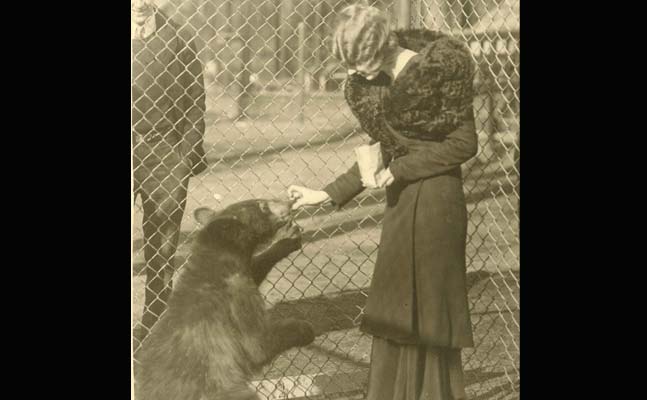I’m not sure how to review, per usual with my 3-star outings, which in my universe means “I liked it” just to be clear. The prose and a lot of the ornament, characters, and set-pieces really worked for me. The overall structure of the novel and its pacing did not. I was confounded at least once in my expectation that this was paranormal romance, which is a problem of my expectations, and not of the book. It is closer to dark fantasy, nearer in tone to Neil Gaiman than Karen Marie Moning. Maybe Charles de Lint is the best comparison.
Fable Montgomery returns to Portland to deal with her beloved Aunt Celeste’s murder. The opening is slow, the hot cop and his chilly female partner settling in for some round-the-clock surveillance, with what I felt like was the usual hand-wringing about pasts and lost opportunities and tense conversations, cut with a little spooking for fun. The fairy statue keeps moving whyyyy? Then, the whole thing shifted leftwise, and the air filled with feathered beings and the house filled with funny, drunk aunts, and I really started enjoying myself.
Fable is whisked to a otherworld called Aria, learning her lost history and managing her grief for her aunt. I find these paranormal otherlands pretty great landscapes for characters to work out grief. It’s a good metaphor because the world no longer makes sense without the loved one in it, its customs antique and occult, and if only she were living everything would make sense. Fable flounders, learning the way we often do more about her aunt in death than she knew in life. We sit in rooms, hearing stories from those who knew the dead in ways we couldn’t or didn’t, and it’s an otherworld. That this otherworld is also cut with half-remembered childhood – the way the lost family member is also the loss of childhood on some level – that was some seriously cool stuff.
As I said, the ornament here is fantastic, in both senses of the word, and there’s some great stuff involving evil ravens that bloom out of tattoos on the edge of a knife, or the landscape blurring past in the arms of what is morphologically an angel. However, I don’t think this is a spoiler to say that Fable’s past is a secret history, a childhood in Narnian escapes run to amnesia for occult reasons, a common enough trope in fantasy literature to be both familiar and frustrating. She catches up much slower than I would prefer, especially given the complex backstory and world-building that is attempted in the blank space of her memory, characters allowed to explain at length what is going on, but not what really is going on. The expository restraint was too restrained.
I think I’ve said this before, but an intrinsic problem with modern characters swooped into fantasy worlds is that that characters have to spend too much time on the exposition couch mutteringthis is not happening. We as readers know they are in a fantasy novel, but they don’t, and while it would blow character believability to have them accept their new fantastic surroundings too fast, it’s still a little frustrating to watch them flounder. This can can be made up for by the potential for neat, anachronistic – this is the wrong word, but whatever – dialogue, where fantastic creatures ask about the most recent season of Survivor, or Fable drops an f-bomb. Maybe this is sounding like a cut-down, but I really do dig this, when modern folk rub shoulders with all the ye gads fol de rol of the Grimmish mythic idiom, and the modern folk get all Buffy dialogue up in the house. Good.
The device of the lost manuscript – Fable writes a seemingly prescient account of the novel’s proceedings in a near swoon, which is then stolen but for precious pages – is deployed somewhat clumsily. At times it is this nifty almost postmodern commentary on linearity in story and the whole bothersome fate business in fantastic fiction, and at others it’s a tiresome infodump that set me itching to skim. The lost manuscript folds up really nicely in the end, so my issue is more structural than anything – I think there could have been a mechanism other than the bald reading-out of the pages that transpires.
Though I said this wasn’t paranormal romance, and it isn’t, there is a love story on the edge of the proceedings, which in many ways I dug. Fable’s not some half-assed virginal dimbulb who doesn’t understand her own feeeelings down there. And while I said that her love interest was functionally an angel, the fact that dude is part bird is understood and freaked out about as the partial bestiality it is. No, he’s not a dumb beast, but he isn’t exactly human either, right? Maybe this sounds like a turn-off – oh noes, TEH BESTIALITY – but I really dig when writers own the unsafe edges of these creatures and their hybrid natures.
This bit here is an actual spoiler, I think, dealing with something that happens very late in the book. It isn’t, like, totally plot pivotal, but it is an aspect of the love interest’s relationship that is pretty central. SPOILERS. Anyway, the only thing that flipped my shit – and I admit this is a personal hang up of mine – is that my eyes roll back into my head whenever the mate-for-life trope is activated. And when angel man high-handedly pulled off some lifelong “mating” with Fable without her knowledge or consent, I was eye-rolling. This wasn’t as coercive as I’ve seen it done before when the trope comes up – there are complexities due to the secret history which make consent/identity/etc murky – and the lead up was cooler and more sexy than usual – but mate-for-life still ticks me off.
I think my real problem is I don’t get the point of the mate-for-life trope in fiction, except as a pander to lame, simplistic readerly or authorial instincts. This man is not just true-blue, he’s so true-blue he’s biologically incapable of loving someone else ever! No worries, forever! (See, for example, the treatment of Jacob and all of the other imprinted wolves in the Twilight books.) And one that introduces ethical and behavioral complications no writer yet has taken on, as far as I’ve seen. So, he’s bound for life to his mate? And she is not in the same manner? What happens when, in a couple months when the thrill is gone for her, she tries to leave? Or even, let’s give it 20 years, and they’re empty nesters (har-de-har-har) who have grown increasingly apart, and she discovers the writings of Erica Jong? He descends into martyred alcoholism? Or does he kill her because he owns her in his mind?
Love is an emotion, and never unconditional or unbreakable. Nor should it be, imao; people are capable of terrible, love-destroying acts, and while it’s tempting to pull out a bunch of genocide and other rhetorical point-scorers to make my point, even some of the more garden variety betrayals and cruelties should not (or cannot) be forgiven or gotten over. That someone could be stuck in a love relationship he has no emotional agency within – literally forced to love – regardless of anything the other person does, this strikes me as seriously depressing. Admittedly, I’m a bitter old crank though, and given how often I run into mate-for-life motifs, I’m probably an outlier in freaking out about it. And, the way it was used here was more to establish our fella as a gauzy dreamboat with feeelings, which is the best of the options with this trope. /SPOILERS
Again, this is not a huge part of their relationship, and in other regards I liked the ways they interacted and related, especially Fable’s checkered romantic history and her general competence despite the weirdness and danger going on here. There’s another situation that impinges on her autonomy, but that is also politically sensitive. She doesn’t lay out an offensive monologue about how unfair it is waa-waa, and then everyone reorders their civilization to make her feel better – something I see happen a lot in fantasy; Mary Sue reorders it all. Nor does she dissolve into a dishrag, but wends to a third option. That’s neat.
So. I enjoyed this world and its characters. There’s a lot of there there, and some real comings to terms with grief and lost childhood. However, the plot felt thin, with no solid payoffs, and the ending dot-dot-dots to the next installment in what I felt was a frustrating manner. This felt like scene-setting or prologue, and the ending is not so much a cliffhanger as an indecisive break. Which bums me out, because there is certainly something here. All that said, I think I’m on the hook for the next installment. First novels are what they are, and given the strengths of this one, there’s a lot of potential. And actual and fantastical. Which, boo yah. Plus, I adore the cover.
(And, just a final aside, although I almost never, ever do this, I was approached by the author on GR offering me a copy, and the description was honestly interesting to me. I bought it fair and square, because I geek out a little about direct transactions between authors and readers, but she did kindly send me a cleaned up copy about halfway through my read. As a self-pub, the usual typos had slipped though the editing process – I noticed a few before I switched to the new version – but have since been expunged. So. Here is your stupidly detailed full disclosure abut how I exchanged a few emails with Athena, who seems like a really cool lady. The end.)





